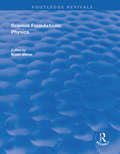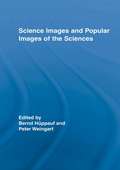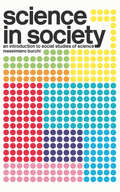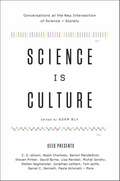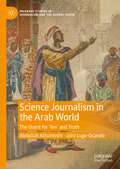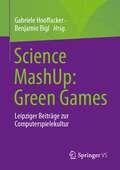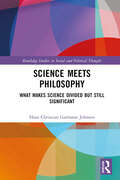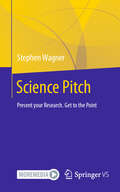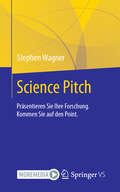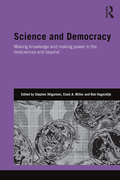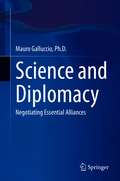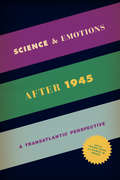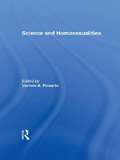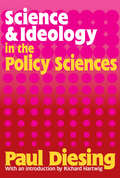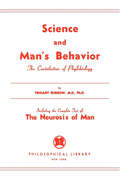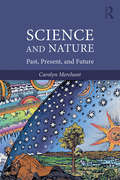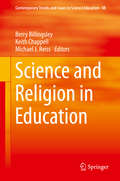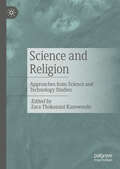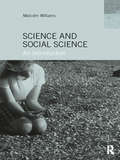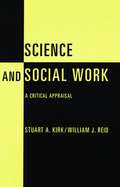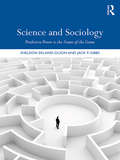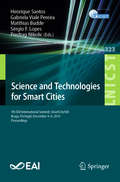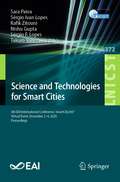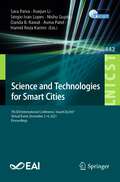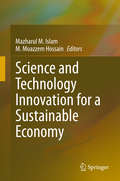- Table View
- List View
Science Foundations: Physics Supplementary Materials (Science Foundations Ser.)
by Bryan MilnerThis title was first published in 2001. The new edition of Science Foundations provides comprehensive coverage of single- and double-award GCSE science. It is fully revised and updated to match the new GCSE specifications, for teaching from September 2001. It contains all the material required for the foundation and higher tiers, with clear progression and explicit differentiation. 'Higher tier only' material is clearly marked in separate spreads. The language level is carefully controlled, with illustrations and layout specifically designed to make the concepts accessible. There are frequent opportunities for students to confirm their understanding of each key idea as it is introduced, via short questions and summary passages on each spread. The books include guidance for students on how to prepare for and answer their GCSE examinations, and a glossary of key words for ease of reference.
Science Images and Popular Images of the Sciences (Routledge Studies in Science, Technology and Society #Vol. 8)
by Peter Weingart Bernd HüppaufWhat is a popular image of science and where does it come from? Little is known about the formation of science images and their transformation into popular images of science. In this anthology, contributions from two areas of expertise: image theory and history and the sociology of the sciences, explore techniques of constructing science images and transforming them into highly ambivalent images that represent the sciences. The essays, most of them with illustrations, present evidence that popular images of the sciences are based upon abstract theories rather than facts, and, equally, images of scientists are stimulated by imagination rather than historical knowledge.
Science In Society: An Introduction to Social Studies of Science
by Massimiano BucchiThe world around us is continually being shaped by science, and by society’s relationship to it. In recent years sociologists have been increasingly preoccupied with the latter, and now in this fascinating book, Massimiano Bucchi provides a brief introduction to this topical issue. Bucchi provides clear and unassuming summaries of all the major theoretical positions within the sociology of science, illustrated with many fascinating examples. Theories covered include Thomas Kuhn's theory of scientific change, the sociology of scientific knowledge, actor-network theory, and the social construction of technology. The second half of the book looks at recent public controversies over the role of science in the modern world including:* the Sokal affair, otherwise known as the science wars* debates over public understanding of science, such as global warming and genetically modified food* the implications of the human genome project. This much needed introduction to a rapidly growing area brings theory alive and will be essential reading for all students of the sociology of science.
Science Is Culture: Conversations at the New Intersection of Science + Society
by Adam BlySeed magazine brings together a unique gathering of prominent scientists, artists, novelists, philosophers and other thinkers who are tearing down the wall between science and culture.We are on the cusp of a twenty-first-century scientific renaissance. Science is driving our culture and conversation unlike ever before, transforming the social, political, economic, aesthetic, and intellectual landscape of our time. Today, science is culture. As global issues—like energy and health—become increasingly interconnected, and as our curiosities—like how the mind works or why the universe is expanding—become more complex, we need a new way of looking at the world that blurs the lines between scientific disciplines and the borders between the sciences and the arts and humanities.In this spirit, the award-winning science magazine Seed has paired scientists with nonscientists to explore ideas of common interest to us all. This book is the result of these illuminating Seed Salon conversations, edited and with an introduction by Seed founder and editor in chief Adam Bly. Science Is Culture includes:E. O. Wilson + Daniel C. DennetSteven Pinker + Rebecca GoldsteinNoam Chomsky + Robert TriversDavid Byrne + Daniel LevitinJonathan Lethem + Janna LevinBenoit Mandelbrot + Paola AntonelliLisa Randall + Chuck HobermanMichel Gondry + Robert StickgoldAlan Lightman + Richard ColtonLaurie David + Stephen SchneiderTom Wolfe + Michael GazzanigaMarc Hauser + Errol Morris
Science Journalism in the Arab World: The Quest for ‘Ilm’ and Truth (Palgrave Studies in Journalism and the Global South)
by Jairo Lugo-Ocando Abdullah AlhuntushiThis book examines the main issues and challenges that science journalism faces in the MENA region while analyzing how journalists in these countries cover science and engage with scientists. Most countries in the Middle East and North Africa region have set an ambitious goal for 2030: to transform their societies and become knowledge economies. This means modernizing institutions and encouraging people to embrace Science, Technology, Engineering and Mathematics as part of their daily lives. This books claims that the main vehicle to achieve this goal is science news reporting, as it continues to be the main platform to disseminate scientific knowledge to the general public. Simultaneously, it is also poorly equipped to achieve this task. Interviewing dozens of journalists, the authors looked at specific areas such as the gender divide and its effects on science news reporting as well as the role of religion and culture in shaping journalism as a political institution. The authors conclude that traditional normative assumptions as to why science reporting does not live up to expectations need to be reviewed in light of other more structural problems such as lack of skills and specialization in science communication in the region. In so doing, the book sets out to understand the past, present and future of science news in one of the most challenging regions in the world for journalists.
Science MashUp: Leipziger Beiträge zur Computerspielekultur
by Gabriele Hooffacker Benjamin BiglDer Band zum Science MashUp Green Games umfasst wissenschaftliche Beiträge zum Thema "Green Games". Das Tagungsthema „Green Games“ zielt auf Ökologie und Nachhaltigkeit von Computerspielen in Bezug auf Spielinhalte sowie in Bezug auf soziale, kulturelle oder technische Aspekte ab. Der Band umfasst zehn Beiträge. Themen sind Aspekte der Nachhaltigkeit in der Produktion, Umsetzung, Zielsetzung und Vermarktung von Games.
Science Meets Philosophy: What Makes Science Divided but Still Significant (Routledge Studies in Social and Political Thought)
by Hans Christian Garmann JohnsenThe book is an attempt to bring together what are often seen as incommensurable scientific and philosophical positions. Its core argument is that a main reason for the divisions about what constitutes scientific knowledge relates to disagreements on philosophical issues. The book explores what these disagreements are about, and discusses whether they can be overcome. Taking a historical perspective, the book traces the divides in science back to three main philosophical traditions: realism, idealism, and scepticism. It maps how these have inspired three main current positions in science: logical empiricism, phenomenology, and sociology of scientific knowledge. The book is intended for a general audience concerned with today’s debates on scientific knowledge and society. It will be useful for students and researchers studying philosophy of science, sociology of scientific knowledge, realism, phenomenology, positivism, logical empiricism, analytical philosophy, and sustainable scientific knowledge.
Science Pitch: Present your Research. Get to the Point
by Stephen WagnerHow can scientists present their projects with power to the point? This book is the ultimate guide for transforming complex research into captivating, convincing Science Pitches in a given time. The innovative ESPRIT model equips scientists with tools to blend professional expertise with personal passion, ensuring every presentation resonates deeply with its target audience. This concise manual combines research excellence and professionalism. It integrates artificial intelligence (AI) applications and slide design. Practice-oriented advice is enriched with real-world examples preparing for outstanding presentations. Designed for students and researchers eager to gain visibility, this book is a unique guide to getting your message across; it advances your research and engages your audience. Unlock your project’s potential and wrap expertise and passion in unique science storytelling. The Science Pitch results in a convincing short talk, successful networking, and securing funding approval for the research project. Via app: Download the SN More Media app for free, scan a link with play button and access videos directly on your smartphone or tablet.
Science Pitch: Präsentieren Sie Ihre Forschung. Kommen Sie auf den Point.
by Stephen WagnerWie können WissenschaftlerInnen ihre Projekte mit Power auf den Point präsentieren? Als ultimativer Leitfaden übersetzt dieses Buch komplexe Forschung in überzeugende Kurzvorträge. Das innovative ESPRIT-Modell gibt WissenschaftlerInnen die nötigen Tools an die Hand, um Professionalität mit Persönlichkeit zu verbinden und so ihr Zielpublikum zu überzeugen. Dieses Praxis-Handbuch integriert Anwendungen der Künstlichen Intelligenz (KI) und Foliengestaltung. Praxisorientierte Tipps mit konkreten Beispielen zeigen auf, wie Studierende und Forschende sichtbar als ExpertInnen wahrgenommen werden können. Mit diesem einzigartigen Leitfaden können sie prägnante Botschaften vermitteln sowie fachliche Expertise und persönliche Leidenschaft zu einem einzigartigen wissenschaftlichen Storytelling verbinden. Der Science Pitch ermöglicht überzeugende Kurzvorträge, erfolgreiches Networking und die Zusage von Fördermitteln für Forschungsprojekte.
Science and Democracy: Making Knowledge and Making Power in the Biosciences and Beyond (Genetics and Society)
by Stephen Hilgartner Clark Miller Rob HagendijkIn the life sciences and beyond, new developments in science and technology and the creation of new social orders go hand in hand. In short, science and society are simultaneously and reciprocally coproduced and changed. Scientific research not only produces new knowledge and technological systems but also constitutes new forms of expertise and contributes to the emergence of new modes of living and new forms of exchange. These dynamic processes are tightly connected to significant redistributions of wealth and power, and they sometimes threaten and sometimes enhance democracy. Understanding these phenomena poses important intellectual and normative challenges: neither traditional social sciences nor prevailing modes of democratic governance have fully grappled with the deep and growing significance of knowledge-making in twenty-first century politics and markets. Building on new work in science and technology studies (STS), this book advances the systematic analysis of the coproduction of knowledge and power in contemporary societies. Using case studies in the new life sciences, supplemented with cases on informatics and other topics such as climate science, this book presents a theoretical framing of coproduction processes while also providing detailed empirical analyses and nuanced comparative work. Science and Democracy: Knowledge as Wealth and Power in the Biosciences and Beyond will be interesting for students of sociology, science & technology studies, history of science, genetics, political science, and public administration.
Science and Diplomacy: Negotiating Essential Alliances
by Mauro Galluccio, Ph.D.This book lays the groundwork for a new field of study and research in the intersection between science and diplomacy. It will review the multi-disciplinary research in this burgeoning area in providing the scientific foundation for the application of psychological principles to understanding and facilitating political decisions in an international context. Focusing on how people think, act, and feel on both individual and collective levels, this book takes into account a realistic perspective from which transformative processes can emerge. It follows the ongoing debate in the EU and the world in providing a better understanding of the tools that can be deployed to improve communication and cooperation between scientists, politicians, and diplomats in this field. The failure of communication in this COVID-19 planetary crisis has not been about whether or not objectives have been achieved, but about the ability of major actors to cooperate to forge links with people. The way policymakers and scientists will manage their interpersonal negotiations will be of great importance in fostering international cooperation and coordinated problem-solving behaviours. Otherwise, science diplomacy will lose sight of its most important purpose: that of helping to solve problems, conflicts, and diplomatic processes for the sake of humanity.
Science and Emotions after 1945: A Transatlantic Perspective
by Edited by Frank Biess Daniel M. GrossThrough the first half of the twentieth century, emotions were a legitimate object of scientific study across a variety of disciplines. After 1945, however, in the wake of Nazi irrationalism, emotions became increasingly marginalized and postwar rationalism took central stage. Emotion remained on the scene of scientific and popular study but largely at the fringes as a behavioral reflex, or as a concern of the private sphere. So why, by the 1960s, had the study of emotions returned to the forefront of academic investigation? In Science and Emotions after 1945, Frank Biess and Daniel M. Gross chronicle the curious resurgence of emotion studies and show that it was fueled by two very different sources: social movements of the 1960s and brain science. A central claim of the book is that the relatively recent neuroscientific study of emotion did not initiate #150; but instead consolidated #150; the emotional turn by clearing the ground for multidisciplinary work on the emotions Science and Emotions after 1945 tells the story of this shift by looking closely at scientific disciplines in which the study of emotions has featured prominently, including medicine, psychiatry, neuroscience, and the social sciences, viewed in each case from a humanities perspective.
Science and Homosexualities: A Guide To The Debates (Controversies In Science Ser.)
by Vernon A. RosarioScience and Homosexualities is the first anthology by historians of science to examine European and American scientific research on sexual orientation since the coining of the word "homosexual" almost 150 years ago. This collection is particularly timely given the enormous scientific and popular interest in biological studies of homosexuality, and the importance given such studies in current legal, legislative and cultural debates concerning gay civil rights. However, scientific and popular literature discussing the biology of sexual orientation have been short-sighted in representing it as objective, new scientific work. This volume demonstrates that the quest for the biological "cause" of homosexuality and other sexualities is as old as the term itself. These essays explore the active role experimental subjects played in shaping scientific theories of homosexuality and cultural perceptions of sexuality and sexual identity. Finally this anthology studies the way in which this doctor-patient interaction shaped not only scientific theories of homosexuality, but also cultural perceptions and self-identities as well. Contributors include: Garland E. Allen, Erin G. Carlston, Julian Carter, Alice D. Dreger, Anne Fausto-Sterling, Margaret Gibson, Stephanie Kenen, Hubert Kennedy, Harry Oosterhuis, James Steakley, Richard Pillard, Jennifer Terry
Science and Ideology in the Policy Sciences
by Paul DiesingThe purpose of this book is to examine how ideology operates--in the sense of influencing the conduct of inquiry--in the policy sciences, defined as economics, political science, and sociology. The author seeks to identify the main ideologies and show how each ideology produces a preference for certain problems, methods, and hypotheses; how it sensitizes scientists to certain phenomena and suggests certain interpretations of those phenomena; and how it closes off other phenomena and concepts from investigation and testing, or at least distorts that investigation. In this book, Diesing critically examines all the major schools of policy-related social thought from 1930 to 1975. He deals with Neoclassical Economics and its various applications, the Keynesians, the Systems Approach, the Schumpeter perspective, the Critical Intellectuals, the Pluralists, the J. K. Galbraith School, New Left Marxism, and the Ecological Paradigm of Schumacher and others. The world looks different if your perspective is that of a rational small businessman working in a society of hypothetical perfect competition, as opposed to that of a proletarian, looking up at your oppressors. Part One is descriptive and evaluative, considering each ideology in turn; Part Two considers the policy implications. "In 1982, Diesing published a remarkable book entitled Science and Ideology in the Policy Sciences. When I interviewed Diesing in Buffalo in the summer of 1984, he told me that to date, the publication had been reviewed in only two professional journals. I was astounded. Science & Ideology...was the best book I had read in a decade, and it related directly to all the policy sciences. The lack of professional response may partially reflect Diesing's disinterest in self-promotion, but beyond this is the 'community' problem. Scholars are recognized within disciplines, but there is only a tiny 'community of social science'. I consider this to be the most brilliant of Diesing's books. Like all of Diesing's works, it remains highly relevant today."--from the introduction by Richard Hartwig.
Science and Man's Behavior
by Trigant BurrowEdited and compiled by William E. Galt after Burrow's death, Science and Man's Behavior: The Contribution of Phylobiology details the practices and therapies of one of the founding fathers of behavioral psychology. As a psychologist, Burrow was most interested in understanding and resolving man's behavioral conflict. He worked to shed light on behavioral disorders through his use of group- and phylo-therapy. Join Galt on a journey through Burrow's theories and practices in this important early text on a groundbreaking twentieth-century methodology. Trigiant Burrow was a founder of phylobiology and was a pioneer of using phyloanalysis as a therapy tool. Burrow was a trained doctor, biologist, and psychologist who specialized in experimental psychology. He studied psychoanalysis with Carl Jung and brought the European techniques to the United States. He studied and practiced experimental and behavioral psychology in Baltimore, Maryland for most of his life.
Science and Nature: Past, Present, and Future (H. Eugene And Lillian Youngs Lehman Ser.)
by Carolyn MerchantScience and Nature brings together the work and insights of historian Carolyn Merchant on the history of science, environmental history, and ethics. The book explores her ideas about the interconnections among science, women, nature, and history as they have emerged over her academic lifetime. Focusing on topics such as "The Death of Nature," the Scientific Revolution, women in the history of science and environment, and partnership ethics, it synthesizes her writings and sets out a vision for the twenty-first century. Anyone interested in the interactions between science and nature in the past, present, and future will want to read this book. It is an ideal text for courses on the environment, environmental history, history of science, and the philosophy of science.
Science and Religion in Education (Contemporary Trends and Issues in Science Education #48)
by Michael J. Reiss Berry Billingsley Keith ChappellThis book brings together the latest research in education in relation to science and religion. Leading international scholars and practitioners provide vital insights into the underlying debates and present a range of practical approaches for teaching. Key themes include the origin of the universe, the theory of evolution, the nature of the human person, the nature of science and Artificial Intelligence. These are explored in a range of international contexts. The book provides a valuable resource for teachers, students and researchers in the fields of education, science, religious education and the growing specialist field of science and religion.Science and Religion in Education is a compelling read for current and future generations of academic researchers and teachers who wish to explore the fascinating intersect between science education and religious studies. The research findings and insights presented by these international scholars offer new dimensions on contemporary practice. - Vaille Dawson, Professor of Science Education, University of Western AustraliaScience and Religion in Education offers a fascinating and diverse collection of chapters surveying the current state of thinking about how science and religion can be understood in education. The book offers a wealth of thought-provoking material for anyone interested in the natures of science and religion, their relationship(s), or their representation within the curriculum. - Professor Keith Taber, University of CambridgeScience education and religious education are uncomfortable bedfellows. This book, written in part as a response to the – perhaps too clear – accounts of Ian Barbour, provides suitably nuanced pictures of how science and religion are dealt with in schools. Whatever the views of specialists, young people ‘receive’ an education in both science and religion: hearing their voices is refreshing in such a serious academic account. - Julian Stern, Professor of Education and Religion, York St John UniversityHumans have long endeavored to make sense of the world often using science and religion. Yet, these two great traditions are frequently seen as incompatible. This useful volume features thoughtful contributions from experts whose work straddles the divide and provides educators with arguments, engaging strategies and historical perspectives to help build a bridge and allow a fruitful discussion in schools. - William F. McComas, Distinguished Professor of Science Education, University of ArkansasEqual parts critical examination of existing models for the relationship between science and religion, scholarly exposition of newer models, and insights toward practical application in classrooms, this book is an invaluable resource for science and religion educators. If you have been thinking it is time we looked beyond Barbour’s taxonomy, you will want to read this book. If you have not, I implore you to read this book. - Jason Wiles, Associate Professor of Biology and Science Education, Syracuse University
Science and Religion: Approaches from Science and Technology Studies
by Zara Thokozani KamwendoThis edited volume offers new and exciting perspectives on the social study of science and religion through current scholarship grounded in Science and Technology Studies (STS). The contributors explore how STS theories, methods, and concepts can be applied to the study of religion, as well as how to incorporate aspects of religion into STS. The purpose of the volume is to advance the social study of science and religion by fostering the already interdisciplinary nature of the field and to encourage engagement with the intersection between science and religion from a wide range of perspectives.
Science and Social Science: An Introduction
by Malcolm WilliamsIs social science really a science at all, and if so in what sense? This is the first question that any course on the philosophy of the social sciences must tackle. In this brief introduction, Malcolm Williams gives students the grounding that will enable them to discuss the issues involved with confidence. He looks at: * The historical development of natural science and its distinctive methodology * the case in favour of an objective science of the social which follows the same rules * The arguments of social constructionists, interpretative sociologists and others against objectivity and even science itself * recent developments in natural science - for instance the rise of complexity theory and the increased questioning of positivism - which bring it closer to some of the key arguments of social science. Throughout, the book is illustrated with short clear examples taken from the actual practice of social science research and from popular works of natural science which will illuminate the debate for all students whatever their background.
Science and Social Work: A Critical Appraisal
by William J. Reid Stuart KirkScience and Social Work is a critical appraisal of the strategies and methods that have been used to develop knowledge for social work practice. It identifies the major ways in which social workers have drawn upon scientific knowledge and techniques, placing each one in historical perspective by explaining the nature of the problems it was designed to solve and the philosophical, political, and practical questions it raised. Kirk and Reid offer a balanced appraisal of the promises, accomplishments, and limits of such approaches, demonstrating how the fruits of scientific research can aid clinical practice with individuals, families and groups.
Science and Sociology: Predictive Power is the Name of the Game (Themes In The Social Sciences Ser. #No. 37)
by Sheldon Ekland-Olson Jack P. GibbsScience and Sociology is from beginning to end an exploration of what this implies for the social sciences, and sociology in particular. The authors argue that over the last several decades, sociology has become less a science and more a quest for isolated assessments of situations, whether they come from demographic analyses, survey research, or ethnographic studies. Above all else, this book is an attempt to promote and advance scientific sociology, and we write at length specifying the how and why of this objective. With this objective in mind, the question becomes: What would a scientific sociology look like?
Science and Technologies for Smart Cities: 5th EAI International Summit, SmartCity360, Braga, Portugal, December 4-6, 2019, Proceedings (Lecture Notes of the Institute for Computer Sciences, Social Informatics and Telecommunications Engineering #323)
by Henrique Santos Gabriela Viale Pereira Matthias Budde Sérgio F. Lopes Predrag NikolicThis book constitutes the refereed proceedings of the 5th Annual Smart City 360° Summit, held in Braga, Portugal, in December 2019. The volume combines selected papers of four conferences, namely IoT in Urban Space, Urb-IoT 2019, Smart Governance for Sustainable Smart Cities, SmartGov 2019, Sensor Systems and Software, S-Cube 2019, and Intelligent Technologies for Interactive Entertainment, Intetain 2019. The 5 keynote and 32 conference papers presented were carefully reviewed and selected from 113 submissions and present results of multidisciplinary scientific and industry collaboration to solve complex societal, technological and economic problems Smart Cities. As such, the main goals are to promote quality of life, work conditions, mobility and sustainability.
Science and Technologies for Smart Cities: 6th EAI International Conference, SmartCity360°, Virtual Event, December 2-4, 2020, Proceedings (Lecture Notes of the Institute for Computer Sciences, Social Informatics and Telecommunications Engineering #372)
by Nishu Gupta Sara Paiva Rafik Zitouni Sérgio F. Lopes Sérgio Ivan Lopes Takuro YonezawaThis book constitutes the refereed proceedings of the 6th Annual Smart City 360° Summit. Due to COVID-19 pandemic the conference was held virtually. The volume combines selected papers of seven conferences, namely AISCOVID 2020 - International Conference on AI-assisted Solutions for COVID-19 and Biomedical Applications in Smart-Cities; EdgeIoT 2020 - International Conference on Intelligent Edge Processing in the IoT Era; IC4S 2020 - International Conference on Cognitive Computing and Cyber Physical Systems; CiCom 2020 - International Conference on Computational Intelligence and Communications; S-Cube 2020 - International Conference on Sensor Systems and Software; SmartGov 2020 - International Conference on Smart Governance for Sustainable Smart Cities; and finnally, the Urb-IOT 2020 -International Conference on IoT in Urban Space.
Science and Technologies for Smart Cities: 7th EAI International Conference, SmartCity360°, Virtual Event, December 2-4, 2021, Proceedings (Lecture Notes of the Institute for Computer Sciences, Social Informatics and Telecommunications Engineering #442)
by Nishu Gupta Danda B. Rawat Sara Paiva Hamid Reza Karimi Sérgio Ivan Lopes Xuejun Li Asma PatelThis book constitutes the refereed proceedings of the 7th Annual SmartCity360° Summit which was organized in November 2021 in Porto, Portugal. Due to COVID-19 pandemic the conference was held virtually. The volume combines selected papers of 6 conferences, namely EdgeIoT 2021 - International Conference on Intelligent Edge Processing in the IoT Era; IC4S 2021 - International Conference on Cognitive Computing and Cyber Physical Systems; SmartGov 2021 - International Conference on Smart Governance for Sustainable Smart Cities; SmartGift 2021 - International Conference on Smart Grid and Innovative Frontiers in Telecommunications; e PFSM 2021 - International Conference on Privacy and Forensics in Smart Mobility. The 45 full papers were carefully selected from 109 submissions. The papers are organized in four thematic sections on Smart Grid and Innovative Frontiers in Telecommunications; Smart Governance for Sustainable Smart Cities; Privacy and Forensics in Smart Mobility; and Sensor Systems and Software.
Science and Technology Innovation for a Sustainable Economy
by Mazharul M. Islam M. Moazzem HossainThis book discusses the subject of pathways to a sustainable economy through science and technology innovations which are regarded as the important components of the ‘4th Industrial Revolution’. The volume has been developed from Bangladesh’s ‘Vision 2041’ agenda which includes development actions needed to catch up with more developed nations. Most importantly, the goals of the ‘Vision 2041’ have been taken from the dreams of the architect of independent Bangladesh, Bangabandhu (Friends of Bengal) Sheikh Mujibur Rahman. His dream was to make Bangladesh the Switzerland of Asia. The Father of Bangladesh Nation was killed by assassins’ bullets along with his most of the family members in August 1975. After his death, the nation moved backwards while recovering from nine months of liberation post war in 1971.Between 1975 and 1990 Bangladesh was ruled by military and quasi military governments. Bangladesh established a true democratic regime in 1996 with Sheikh Mujib’s daughter, Sheikh Hasina, who formed the government after 21 years with a mandate to realise the dreams of her father. Sheikh Hasina, had her own 20 year vision for Bangladesh, called, ‘Vision 2021’, with plans to make the nation poverty free by 2021. After a pause between 2001 and 2008, Sheikh Hasina returned to power in 2009. Under her consecutive three terms she brought Bangladesh back on track and Bangladesh is one of the nations which reduced poverty half under MDGs by 2015. During her third consecutive term Sheikh Hasina, is on the way to transforming Bangladesh into a ‘middle income’ nation by 2021. This volume aims to identify and mitigate the challenges of ‘4th Industrial Revolution’ investigating the areas of science and technology innovations for Bangladesh and for other parts of the world keeping in mind establishing a sustainable economy under UN agendas to 2030 (SDGs). The primary audience for this book are UN development agencies, academic institutions, government policymakers and business leaders of the more developed and developing nations alike.
